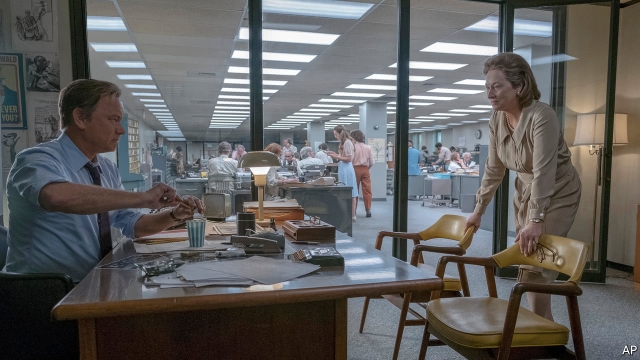Films commonly referred to as “Oscar-bait” usually include a number of big-name actors, usually a relatively famous director, and a clear, dramatic story. The Post takes Oscar-bait above and beyond with a star-studded cast, the legendary Steven Spielberg, and arguably the best film scorer of all time, John Williams. While these are all exciting things to experience while watching the film, these elements take away from the quality of the film. By no means am I criticizing the individual performances of those involved, as I found them spectacular. I am, however, drawing attention to the nature and timing of the film. In terms of political timing, I enjoy the story of an untrustworthy and controversial government being told during this… “interesting” time period in the United States. However, the release date of the film is intentional, as it is popularly referred to as “Oscar season.” Common Oscar elements probably won’t be enough to win Best Picture this year, as the competition is rough (specifically from Three Billboards and The Shape of Water – Spoiler Alert article coming soon).
The first half of The Post was full of exposition that was probably meant to emphasize the stakes but fell flat and felt repetitive and slow. The explanation of the nature of the newspaper industry as well as the controversy surrounding some revealing Vietnam War government documents (known as the Pentagon Papers), dominates the film for the first hour or so. The second half of the film is more interesting, as we finally get to watch Meryl Streep’s character unfold and grow, which I found to be the most compelling aspect of the film. The evolution of Streep’s character from a reserved, “better safe than sorry” type of character into the confident and brave woman she becomes was a pleasant storyline to see in a film that takes place at a male-dominated newspaper company in the 1970s. Tom Hanks and Meryl Streep have reached a point in their careers that their brilliant performances have taken a back seat to their famous names. I no longer see characters on a screen – instead I see Hanks and Streep in costume.
Spielberg’s directing is particularly beautiful; it may not seem like anything special, but that’s exactly what makes it impressive. Spielberg’s simplicity made watching The Post soothing, as he was able to turn a film that mostly takes place indoors, with boring office lighting, into a welcoming and engaging viewing experience. Spielberg’s mesmerizing and recognizable camera work is always a pleasure to see, but it is nothing too remarkable when compared to his other works.
Though it has been nominated for Best Picture at the Oscars this year, I do not see The Post winning in that category. Meryl Streep has been nominated for Lead Actress, but after looking at the exceptional performances by the other women nominated (Sally Hawkins, Frances McDormand, Margot Robbie, and Saoirse Ronan), it’s hard to place a bet on Streep. Go see The Post if you’re interested in the Watergate scandal, if you’re a fan of Hanks and/or Streep, or if you’re trying to catch up on all the Oscar-nominated films, but don’t expect too much. Although it does have some of the biggest names in film history, The Post serves as a prime example of “don’t judge a movie by its poster.”

Be First to Comment